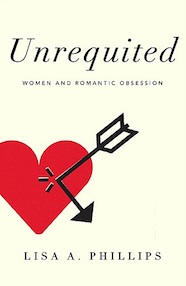By Caitlin Mattera
“Isn’t that what we all dream of, feelings so strong they allow us to flout the rules?” While society tends to idealize the grand romantic gesture, Lisa A. Phillips is a bit more critical. In her well-sourced Unrequited: Women and Romantic Obsession, Phillips investigates the myths and double-standards associated with obsessive love in order to challenge and deepen our understanding of the female psyche and gender relations.
Phillips begins with her own experience: having been rejected by a man she calls B., she resorted to obsessive behaviors and “light stalking” in an attempt to rekindle the relationship. Her own story not only creates ethos for Phillips’ exploration; the journalist also uses her anecdotes to pace and shape her argument about unrequited love.
Unrequited is an argument, a thesis strongly advocating the expansion of society’s definition of unrequited love as well as greater compassion for and in some rare cases, appreciation of, the women whose obsessions drive them to extreme acts. Phillips’ study is a serious investigation of historical context and societal norms, cloaked in pop culture references and buoyed by a genuine voice. With engaging narration, Phillips cleverly weaves together medical studies from ancient Rome, sitcom tropes and interviews of modern women. She decodes cultural examples from Dante to Taylor Swift in order to explain the prevalence and influence of unrequited love, crafting a particularly strong analysis of unrequited love as the most common and romantic love story.
Each chapter functions as a carefully constructed vignette, examining one aspect of obsessive love or society’s expectations. Perhaps the strongest repositions unrequited love as a creative act in which the lover uses a possible partner to envision an impossible future. Phillips employs historical examples to illustrate a tradition of scorned women using rejected advances to fuel artistic endeavors, which in turn may reveal a core value or unvoiced desire. The author deconstructs Mary Wollstonecraft’s publications, arguing that the feminist writer took advantage of her rejection by lover Gilbert Imlay to conduct several business ventures. In this way, Phillips suggests that Wollstonecraft harnesses her passion in order to seize male agency and access opportunities unavailable to a single woman in her society.
Her cultural analysis is augmented by the journalistic skill Phillips demonstrates when incorporating interviews with authentic, modern women whose unrequited loves have inspired every manner of social interaction, from unwanted advances to occasionally aggressive stalking. Though she never excuses their behavior, Phillips casts the women’s actions in a sympathetic light, detailing each story from the initial attraction to the lingering effects of unrequited love on the women afflicted and the men they adore. She codes these radical examples as the natural progression of what she views as an unromantic, hookup culture. Without social cues to guide them, women are liable to turn from understandable romantic feelings to obsession. Phillips’ strength is her ability to re-envision unrequited love as a social phenomenon, as much the fault of modern romantic practices, literary tradition and peer pressure as the women whose emotions drive them to extremes.
Caitlin Mattera (ΦBK, Drew University, 2013) graduated summa cum laude from Drew with bachelor’s degrees in English and Classics, and a minor in Writing. She is currently pursuing graduate study at Drew University in preparation to become a secondary school English teacher.




